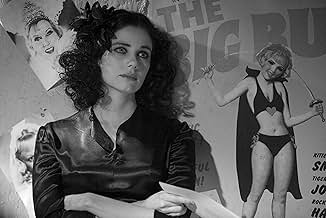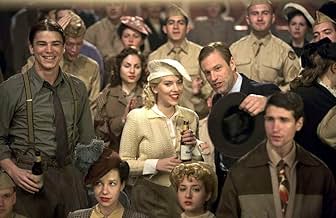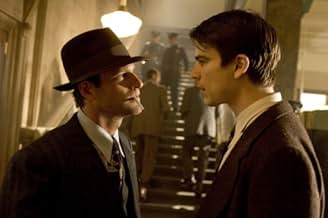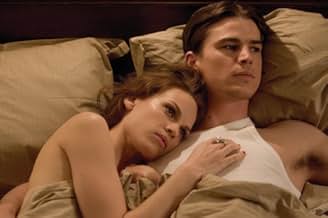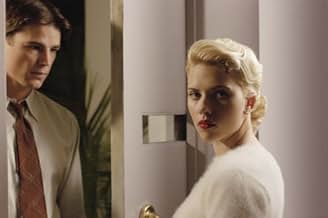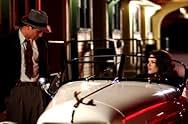AVALIAÇÃO DA IMDb
5,6/10
79 mil
SUA AVALIAÇÃO
Dois policiais veem suas vidas pessoais e profissionais desmoronarem após a investigação do assassinato de Elizabeth Short, a "Dália Negra".Dois policiais veem suas vidas pessoais e profissionais desmoronarem após a investigação do assassinato de Elizabeth Short, a "Dália Negra".Dois policiais veem suas vidas pessoais e profissionais desmoronarem após a investigação do assassinato de Elizabeth Short, a "Dália Negra".
- Direção
- Roteiristas
- Artistas
- Indicado a 1 Oscar
- 4 vitórias e 16 indicações no total
Angus MacInnes
- Capt. John Tierney
- (as Angus MacInnis)
- Direção
- Roteiristas
- Elenco e equipe completos
- Produção, bilheteria e muito mais no IMDbPro
Avaliações em destaque
Now I like Brian DePalma, and I love Carrie, The Untouchables and Carlito's Way. Out of the films of his I've seen, The Black Dahlia is my least favourite in my view, though I was also rather disappointed in Scarface too.
I was really interested in its concept and the story seemed interesting. Also the film is very well made, with stylish cinematography and beautiful scenery, costumes, sets and makeup, DePalma's direction has occasional flashes of brilliance and the music was quite nice as well.
However, this is another case of style over substance. The script falls flat, with little idea of which direction to go, and the tone of the story is also uneven with some scenes disappointingly over-the top. The characters I felt indifferent to, and I also thought they were quite shallow and poorly explored, the pace is rather meandering and with exception of Fiona Shaw who's quite good the acting is bland. Also the ending I think is overdone.
All in all, interesting initially and while well made it is emotionally hollow and flat in its scripting and characterisation. 4/10 Bethany Cox
I was really interested in its concept and the story seemed interesting. Also the film is very well made, with stylish cinematography and beautiful scenery, costumes, sets and makeup, DePalma's direction has occasional flashes of brilliance and the music was quite nice as well.
However, this is another case of style over substance. The script falls flat, with little idea of which direction to go, and the tone of the story is also uneven with some scenes disappointingly over-the top. The characters I felt indifferent to, and I also thought they were quite shallow and poorly explored, the pace is rather meandering and with exception of Fiona Shaw who's quite good the acting is bland. Also the ending I think is overdone.
All in all, interesting initially and while well made it is emotionally hollow and flat in its scripting and characterisation. 4/10 Bethany Cox
I was disappointed in this film mainly because I love James Elroy's books and found that this film did not do it justice. The characters in the film became stereotypes or cardboard 40's characters. Scarlett Johannsen looked like a young Lana Turner on tranquilizers.........very little emotion, so much mumbling.............poor Hilary Swank was just too distracting in her black wig trying to be a 40's vamp ...........I guess we are not accustomed to seeing her that way and she evidently does not do well in sexy, seductive roles............Josh Hartnett did pretty well.........although the constant taking off of clothing of his different ladies seemed a bit tiresome......if I would have had this on video I would have fast forwarded the constant "clothes removal" scenes. James Ellroy also wrote LA Confidential and that was a masterpiece on film.........but of course, the actors were Russell Crowe, Kevin Spacey, Danny Divito, and many very well seasoned actors with a far above average script. Sorry to say that this film is not academy award material as LA Confidential was................Ellroy's stories can be told on film with good writing, competent acting, good casting, good screenplay and continuity. This was not present in The Black Dahlia. Actually, the girl who played The Black Dahlia was the most sensitive and sympathetic and portrayed her character excellently.
"For murder, though it have no tongue, will speak/With most miraculous organ." Shakespeare's Hamlet
Murders are messy on the screen and in real life; screenplays about them can be chaotic and disjointed also. Such is the case with Black Dahlia, a film noir from Brian De Palma, a past master of the macabre and the complicated (Blow Out, Body Double). It has all the trappings of a first-rate detective novel (James Ellroy) made into a 1940's thriller with appropriately moody music of the soulful trumpet (Mark Isham), lush production design (Dante Ferretti), and equally impressive costuming (Jenny Beavan), all set in a timelessly seedy Los Angeles.
There's also the conflicted, sometimes dark hero detective (Josh Hartnett) and the sexy, dangerous femme fatale (Hilary Swank), accompanied by the questionably good voluptuary sex bomb (Scarlett Johansson). As if these noir troublemakers were not enough, writer Josh Friedman seemingly adapts Ellroy's every subplot, every story thread, as if each had to be accounted for in the best CSI tradition.
The original novel was based on aspiring actress Elizabeth Short's unsolved grizzly murder in 1947. After a considerably convoluted exposition, with plot lines rarely intersecting in a unified way, the film has the nerve to offer one of the most extensive denouements in film history, could be a half hour, with lengthy explanation of how all those ends tied together. Needless to say, anti climaxes abound in this last segment, leaving not only more confusion about the plot but also a desire to get back to The Big Sleep without sleeping, a state Black Dahlia threatened several times.
Hartnett's detective says, "Nothing stays buried forever. Nothing." I say this weak noir wannabe should stay buried until a bright 22nd century scholar sees its cultural and aesthetic significance. Until then, it's a jumble of plot points resolved in the end by tedious narration. Even Scarlett Johansson's pulchritude couldn't win me, and that's murder in the first degree.
Murders are messy on the screen and in real life; screenplays about them can be chaotic and disjointed also. Such is the case with Black Dahlia, a film noir from Brian De Palma, a past master of the macabre and the complicated (Blow Out, Body Double). It has all the trappings of a first-rate detective novel (James Ellroy) made into a 1940's thriller with appropriately moody music of the soulful trumpet (Mark Isham), lush production design (Dante Ferretti), and equally impressive costuming (Jenny Beavan), all set in a timelessly seedy Los Angeles.
There's also the conflicted, sometimes dark hero detective (Josh Hartnett) and the sexy, dangerous femme fatale (Hilary Swank), accompanied by the questionably good voluptuary sex bomb (Scarlett Johansson). As if these noir troublemakers were not enough, writer Josh Friedman seemingly adapts Ellroy's every subplot, every story thread, as if each had to be accounted for in the best CSI tradition.
The original novel was based on aspiring actress Elizabeth Short's unsolved grizzly murder in 1947. After a considerably convoluted exposition, with plot lines rarely intersecting in a unified way, the film has the nerve to offer one of the most extensive denouements in film history, could be a half hour, with lengthy explanation of how all those ends tied together. Needless to say, anti climaxes abound in this last segment, leaving not only more confusion about the plot but also a desire to get back to The Big Sleep without sleeping, a state Black Dahlia threatened several times.
Hartnett's detective says, "Nothing stays buried forever. Nothing." I say this weak noir wannabe should stay buried until a bright 22nd century scholar sees its cultural and aesthetic significance. Until then, it's a jumble of plot points resolved in the end by tedious narration. Even Scarlett Johansson's pulchritude couldn't win me, and that's murder in the first degree.
Anybody expecting to get a great account of the Black Dahlia case, even fictional, will be disappointed going in to this movie. Of course, I knew that it was a fictionalization of the case, but I had no idea the movie would present its own evidence and draw its own conclusions.
But the main problem here is not the lack of factual detail, so much as the confusion of plot that surrounds and overwhelms the Black Dahlia case itself. So much plot and character and sideplots and backstory are built around the central characters that the case itself seems like a distraction. A key plot point and character motivator is the fascination of the two detectives with the murder, but this is never elaborated enough in the film, and we're left to half-heartedly guess at the character motivations.
The tone is never consistently campy, but when the camp arrives it overwhelms the story. A dinner scene between a suspect and her family had the crowd in stitches (the only scene during which the audience laughed). The problem is that the scene is valuable to the plot and should never have been played for laughs. Hitchcock or even Lynch could have shot the same scene, with the same events and dialogue, and made it menacing and creepy, which it needed to be to function in the mystery.
Other problems: De Palma uses the lesbian angle of the movie (never a part of the case) to full exploitative advantage, and the actresses seem unable to master to the expressive 1940s style acting that would have come naturally to even a marginal 40s star.
Although the film brings a clearcut finale rather than a vague puzzle, too many loose threads come together too neatly and rather than bringing the film to a satisfactory conclusion, it leaves you scratching your head, is this what I spent the last 2 hours waiting to hear? Overall, there is too much plot, too little character development and a wildly uneven tone. The movie has its moments but it's a blinding mess all together.
But the main problem here is not the lack of factual detail, so much as the confusion of plot that surrounds and overwhelms the Black Dahlia case itself. So much plot and character and sideplots and backstory are built around the central characters that the case itself seems like a distraction. A key plot point and character motivator is the fascination of the two detectives with the murder, but this is never elaborated enough in the film, and we're left to half-heartedly guess at the character motivations.
The tone is never consistently campy, but when the camp arrives it overwhelms the story. A dinner scene between a suspect and her family had the crowd in stitches (the only scene during which the audience laughed). The problem is that the scene is valuable to the plot and should never have been played for laughs. Hitchcock or even Lynch could have shot the same scene, with the same events and dialogue, and made it menacing and creepy, which it needed to be to function in the mystery.
Other problems: De Palma uses the lesbian angle of the movie (never a part of the case) to full exploitative advantage, and the actresses seem unable to master to the expressive 1940s style acting that would have come naturally to even a marginal 40s star.
Although the film brings a clearcut finale rather than a vague puzzle, too many loose threads come together too neatly and rather than bringing the film to a satisfactory conclusion, it leaves you scratching your head, is this what I spent the last 2 hours waiting to hear? Overall, there is too much plot, too little character development and a wildly uneven tone. The movie has its moments but it's a blinding mess all together.
Have you ever been with a master storyteller who is hot? I mean in person. Its an absolutely captivating thing, watching the craft of captivating you. Its a worthy experience, even when the story isn't good. In fact, its even better when they story isn't good. You might wonder for a while why such a talented teller would choose the material she has, but will fade as you fall under spell of the storyteller, undistracted by the story. It you are lucky, she'll be a hand dancer and you will simply allow your soul to move with the undermusic.
dePalma never bothers me when he chooses bad actors, stories and such. Its just not relevant to what he has to offer, and in fact sometimes I'm thankful that the story itself doesn't get in the way. "Mission to Mars" was rewarmed tacos, but the fact that it was served by a metaphoric, genuine Spanish grandmother from her own hands was all that mattered.
About 22 minutes into this there is a wonderful crane shot, probably done without artificial assistance, beginning five minutes which is the heart of the overly complex story. It sets up two apparently unrelated threads in the story that interweave from this point. It is of the front of a building where later there will be a shooting, moves up and over the building to look at a vacant lot behind where we see a woman making a gruesome discovery. She runs to the street alongside the building where we see the car of our two cops coming to park in front and engage in a shooting. We move in front of the car to a bicyclist, who plays no role in the story. He brings us to a couple walking down the sidewalk approaching the front of the building where they will encounter our cops. We come down to street height and listen in on their conversation.
Its masterful. Even if you think everything that follows is a mess, its a glorious mess made glorious by our setting of the knitting needles.
This, my friends, is what noir is about these days: establishing an eye of god who both is us and who perturbs nature to suit conventions of coincidence in storytelling.
But there's another joy here too. The story no surprise features a film within the film. Its the whole story, there, with elements of that internal film overlapping the main story in three or four significant ways. The star of this inner film, who also is our bisected victim is a character played by Mia Kirshner. She's so much more alive and real than anyone else in the main story, I can only assume it was deliberate and a truly thrilling risk. If you follow film, you'll know her very similar and hugely complex role in "Exotica," a landmark film.
Two major experiences in a film! Of course its worth watching!
Ted's Evaluation -- 3 of 3: Worth watching.
dePalma never bothers me when he chooses bad actors, stories and such. Its just not relevant to what he has to offer, and in fact sometimes I'm thankful that the story itself doesn't get in the way. "Mission to Mars" was rewarmed tacos, but the fact that it was served by a metaphoric, genuine Spanish grandmother from her own hands was all that mattered.
About 22 minutes into this there is a wonderful crane shot, probably done without artificial assistance, beginning five minutes which is the heart of the overly complex story. It sets up two apparently unrelated threads in the story that interweave from this point. It is of the front of a building where later there will be a shooting, moves up and over the building to look at a vacant lot behind where we see a woman making a gruesome discovery. She runs to the street alongside the building where we see the car of our two cops coming to park in front and engage in a shooting. We move in front of the car to a bicyclist, who plays no role in the story. He brings us to a couple walking down the sidewalk approaching the front of the building where they will encounter our cops. We come down to street height and listen in on their conversation.
Its masterful. Even if you think everything that follows is a mess, its a glorious mess made glorious by our setting of the knitting needles.
This, my friends, is what noir is about these days: establishing an eye of god who both is us and who perturbs nature to suit conventions of coincidence in storytelling.
But there's another joy here too. The story no surprise features a film within the film. Its the whole story, there, with elements of that internal film overlapping the main story in three or four significant ways. The star of this inner film, who also is our bisected victim is a character played by Mia Kirshner. She's so much more alive and real than anyone else in the main story, I can only assume it was deliberate and a truly thrilling risk. If you follow film, you'll know her very similar and hugely complex role in "Exotica," a landmark film.
Two major experiences in a film! Of course its worth watching!
Ted's Evaluation -- 3 of 3: Worth watching.
Você sabia?
- CuriosidadesWhen Dwight "Bucky" Bleichert goes searching through some photographs, you can see a real autopsy photo of Elizabeth Short.
- Erros de gravaçãoWhen Bucky Bleichert enters Sheryl Saddon's bedroom to get the suitcase, there is a postcard-sized picture of Bettie Page on the wall. Bettie Page did not start modeling until 1950.
- Citações
Emmet Linscott: What kind of name is Bleichert? Dutch?
Ofcr. Dwight "Bucky" Bleichert: German.
Emmet Linscott: Ah, a great people, the Germans. Hitler was a bit excessive. But mark my words that someday we'll regret not joining forces with him to fight the Reds.
- Trilhas sonorasIn the Mood
Written by Joe Garland (as Joseph C. Garland)
Used by Permission of Shapiro Bernstein & Co. Inc. (ASCAP)
Principais escolhas
Faça login para avaliar e ver a lista de recomendações personalizadas
Detalhes
- Data de lançamento
- Países de origem
- Idiomas
- Também conhecido como
- La Dalia Negra
- Locações de filme
- Empresas de produção
- Consulte mais créditos da empresa na IMDbPro
Bilheteria
- Orçamento
- US$ 50.000.000 (estimativa)
- Faturamento bruto nos EUA e Canadá
- US$ 22.545.080
- Fim de semana de estreia nos EUA e Canadá
- US$ 10.005.895
- 17 de set. de 2006
- Faturamento bruto mundial
- US$ 49.332.692
- Tempo de duração
- 2 h 1 min(121 min)
- Cor
- Mixagem de som
- Proporção
- 2.35 : 1
Contribua para esta página
Sugerir uma alteração ou adicionar conteúdo ausente







